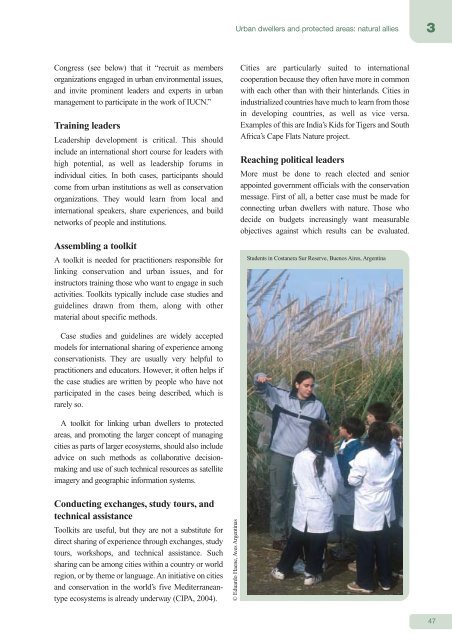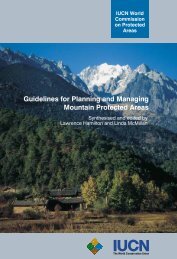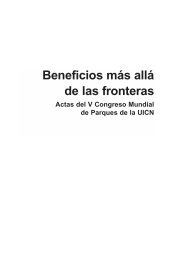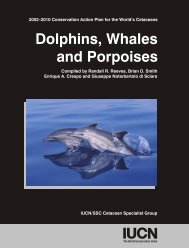1.Front section - IUCN
1.Front section - IUCN
1.Front section - IUCN
You also want an ePaper? Increase the reach of your titles
YUMPU automatically turns print PDFs into web optimized ePapers that Google loves.
Urban dwellers and protected areas: natural allies 3<br />
Congress (see below) that it “recruit as members<br />
organizations engaged in urban environmental issues,<br />
and invite prominent leaders and experts in urban<br />
management to participate in the work of <strong>IUCN</strong>.”<br />
Training leaders<br />
Leadership development is critical. This should<br />
include an international short course for leaders with<br />
high potential, as well as leadership forums in<br />
individual cities. In both cases, participants should<br />
come from urban institutions as well as conservation<br />
organizations. They would learn from local and<br />
international speakers, share experiences, and build<br />
networks of people and institutions.<br />
Assembling a toolkit<br />
A toolkit is needed for practitioners responsible for<br />
linking conservation and urban issues, and for<br />
instructors training those who want to engage in such<br />
activities. Toolkits typically include case studies and<br />
guidelines drawn from them, along with other<br />
material about specific methods.<br />
Cities are particularly suited to international<br />
cooperation because they often have more in common<br />
with each other than with their hinterlands. Cities in<br />
industrialized countries have much to learn from those<br />
in developing countries, as well as vice versa.<br />
Examples of this are India’s Kids for Tigers and South<br />
Africa’s Cape Flats Nature project.<br />
Reaching political leaders<br />
More must be done to reach elected and senior<br />
appointed government officials with the conservation<br />
message. First of all, a better case must be made for<br />
connecting urban dwellers with nature. Those who<br />
decide on budgets increasingly want measurable<br />
objectives against which results can be evaluated.<br />
Students in Costanera Sur Reserve, Buenos Aires, Argentina<br />
Case studies and guidelines are widely accepted<br />
models for international sharing of experience among<br />
conservationists. They are usually very helpful to<br />
practitioners and educators. However, it often helps if<br />
the case studies are written by people who have not<br />
participated in the cases being described, which is<br />
rarely so.<br />
A toolkit for linking urban dwellers to protected<br />
areas, and promoting the larger concept of managing<br />
cities as parts of larger ecosystems, should also include<br />
advice on such methods as collaborative decisionmaking<br />
and use of such technical resources as satellite<br />
imagery and geographic information systems.<br />
Conducting exchanges, study tours, and<br />
technical assistance<br />
Toolkits are useful, but they are not a substitute for<br />
direct sharing of experience through exchanges, study<br />
tours, workshops, and technical assistance. Such<br />
sharing can be among cities within a country or world<br />
region, or by theme or language. An initiative on cities<br />
and conservation in the world’s five Mediterraneantype<br />
ecosystems is already underway (CIPA, 2004).<br />
© Eduardo Haene, Aves Argentinas<br />
47






